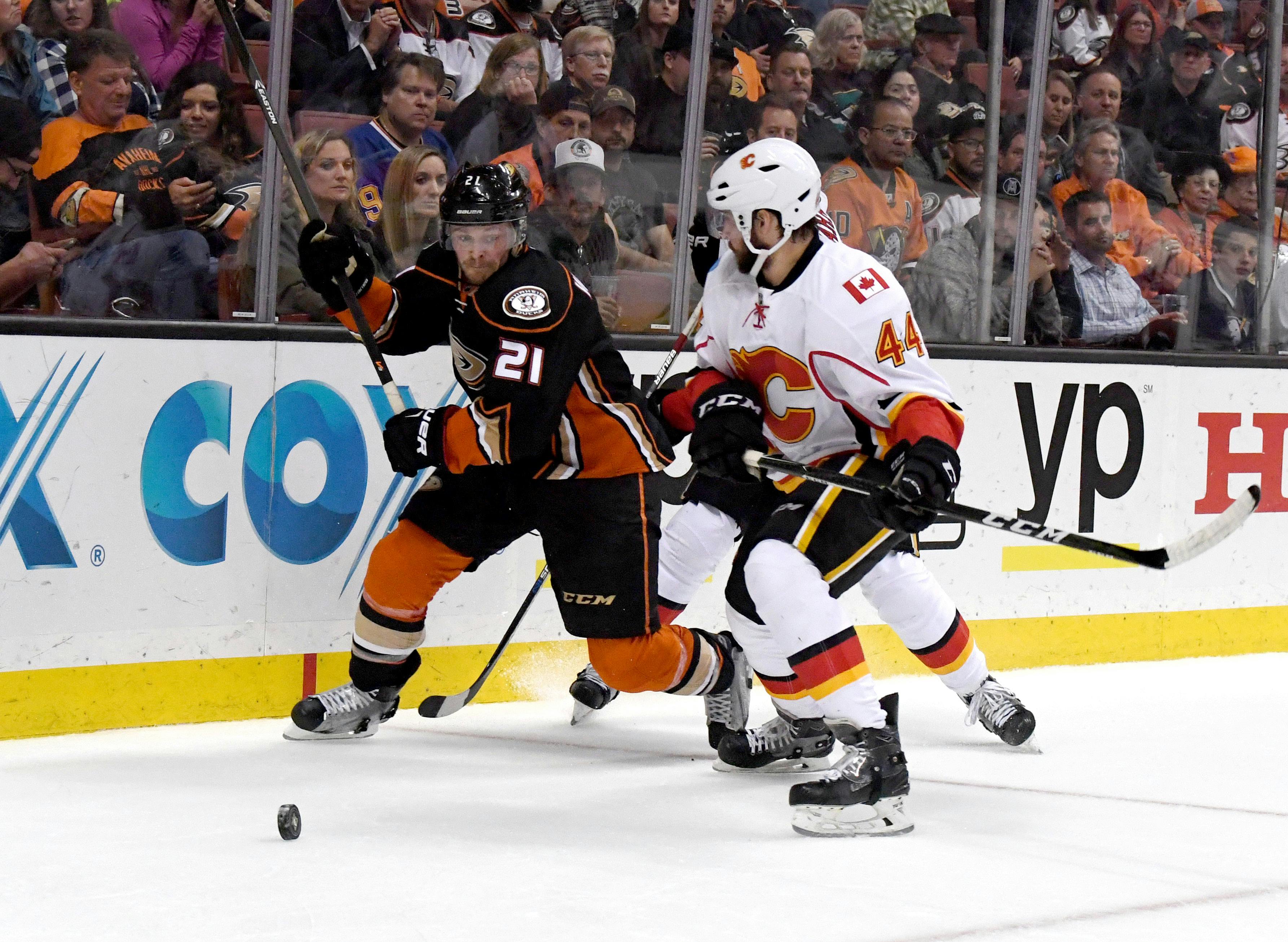Nation Sites
The Nation Network
FlamesNation has no direct affiliation to the Calgary Flames, Calgary Sports and Entertainment, NHL, or NHLPA
A game score look at the Flames and Ducks

Photo credit: Kirby Lee / USA Today Sports
When the first round schedule was set and the match-up cemented for the Calgary Flames, my first thought was wondering just who these Anaheim Ducks are. I’ve seen the Ducks five times this year, but I cannot admit a deep, abiding familiarity with them the way I can with other teams. (I blame the Pacific time zone.)
Thankfully, the metric known as game score can showcase just how well (or poorly) the Flames match up with the Ducks and if there are any holes in their lineup that could be exploited (or visa versa). With that in mind, I’ve crunched the numbers and set up a nice little comparison between the two clubs.
What’s game score?
Last spring, our pal Dom Luszczyszyn (@domluszczyszyn on Twitter) tried to encapsulate a lot of statistical noise into one handy metric for assessing game performances, taking a cue from baseball and other sports that have done the same. Tying in goals, assists, shots, blocks, Corsi differential, penalty differential, faceoff differential and goal differential, he created “game score.”
For our purposes, I’ve slightly modified game score and used even strength instead of five-on-five for the Corsi differentials for the Flames this season. Functionally speaking, it doesn’t change the numbers a heck of a lot so team-to-team comparisons likely aren’t too far off-base.
The Ducks
Here are the Ducks’ projected lines for this series. (The expectation is that Holzer will be back for Game 1, while I’ve included Ritchie rather than Kase in the lines since Ritchie’s suspension only covers Game 1.)
In terms of what the numbers mean: anything above 0.450 is considered a good average game score, while anything above 0.950 is very, very good.
| LW | C | RW |
|---|---|---|
 Nick Ritchie GS: 0.430 |  Ryan Getzlaf GS: 0.870 |  Patrick Eaves GS: 0.763 |
 Andrew Cogliano GS: 0.586 |  Ryan Kesler GS: 0.760 |  Jakob Silfverberg GS: 0.733 |
 Rickard Rakell GS: 0.773 |  Antoine Vermette GS: 0.375 |  Corey Perry GS: 0.650 |
 Chris Wagner GS: 0.143 |  Nate Thompson GS: -0.021 |  Logan Shaw GS: 0.137 |
| Defensive Pairings | |
|---|---|
 Hampus Lindholm GS: 0.505 |  Brandon Montour GS: 0.350 |
 Josh Manson GS: 0.333 |  Sami Vatanen GS: 0.400 |
 Korbinian Holzer GS: 0.019 |  Kevin Bieksa GS: 0.107 |
Extras: Shea Theodore (0.288), Jared Boll (-0.034), Ondrej Kase (0.365)
Goalies: John Gibson (0.981), Jonathan Bernier (0.709)
The good news is that the Ducks’ fourth line and third defensive pairing aren’t very good. The bad news is that the Ducks are pretty balanced otherwise. They have the ability to roll three really good lines (and two pretty solid defensive pairings, even without Cam Fowler and Clayton Stoner), which makes it tough to try to isolate their weak areas – try to pick just one line for Mikael Backlund to shut down; what about the other two? The Ducks also have two really good goaltenders and a couple perfectly acceptable options in Theodore and Kase sitting in the press box.
In other words: the Ducks are deep and pretty good.
The Flames
| LW | C | RW |
|---|---|---|
 Johnny Gaudreau GS: 0.857 |  Sean Monahan GS: 0.662 |  Micheal Ferland GS: 0.312 |
 Matthew Tkachuk GS: 0.786 |  Mikael Backlund GS: 0.777 |  Michael Frolik GS: 0.688 |
 Kris Versteeg GS: 0.488 |  Sam Bennett GS: 0.280 |  Alex Chiasson GS: 0.334 |
 Lance Bouma GS: 0.109 |  Matt Stajan GS: 0.242 |  Troy Brouwer GS: 0.166 |
| Defensive Pairings | |
|---|---|
 Mark Giordano GS: 0.691 |  Dougie Hamilton GS: 0.810 |
 T.J. Brodie GS: 0.400 |  Michael Stone GS: 0.279 |
 Matt Bartkowski GS: -0.053 |  Deryk Engelland GS: 0.252 |
Extras: Curtis Lazar (0.445), Dennis Wideman (0.360), Freddie Hamilton (0.109)
Goalies: Brian Elliott (0.576), Chad Johnson (0.658)
The Flames have two really good lines and a really good defensive pairing. It falls off a bit after that, as the Sam Bennett line and T.J. Brodie’s pairing are pretty decent, but not quite as good as what the Ducks have. The Flames fourth line and third defensive pairings are, statistically-speaking, liabilities on the ice.
Calgary’s goaltenders are both pretty good, though not quite as good as Anaheim’s dynamic duo. The Flames do, however, have similar depth in the press box in the form of Lazar and Wideman. For what it’s worth, though, Wideman’s functionally inter-changeable with Stone in terms of his game score impact.
The Breakdown
Goaltending: Anaheim has a clear advantage.
Defense: This is probably a tie. The Flames have a much better top pairing than anything the Ducks can trot out, but Anaheim’s depth is arguably better than Calgary’s. For now this is a tie, but it tilts in Anaheim’s favour if Stoner or Theodore push Bieksa or Holzer to the press box.
Forwards: Anaheim has a clear advantage, particularly in terms of their depth. Once you get to the third lines facing off, the Ducks could do some damage. The Flames do have a better forth line than Anaheim, but that’s not worth a ton.
In other words, the Flames are probably a deserved underdog in this series if you judge the players involved by their game scores.
Breaking News
- A Flame From the Past: Erik Gudbranson
- Flames roster news: Zayne Parekh’s impending return and other notes
- Recap: Wranglers are burned on special teams in 5-1 loss against the Barracuda
- Flames Game Day 54: A matinee against San Jose (2pm MT, SNW)
- Flashback Friday: Looking at the three playoff series between the Flames and Sharks
